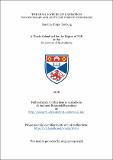The dual nature of causation : two necessary and jointly sufficient conditions
Abstract
In this dissertation, I propose a reductive account of causation. This account may be stated as follows:
Causation: 𝘤 is a cause of 𝘦 within a possibility horizon ℋ iff
a) 𝘤 is process-connected to 𝘦, and
b) 𝘦 security-depends on 𝘤 within ℋ.
More precisely, my suggestion is that there are two kinds of causal relata: instantaneous events (defined in Chapter 4) and possibility horizons (defined in Chapter 5). Causation is a ternary relation between two actual instantaneous events – the cause 𝘤 and the effect 𝘦 – and a possibility horizon ℋ.
I argue that causation has a dual nature: on the one hand, a cause must be connected to its effect via a genuine process; on the other hand, a cause must make a difference to its effect.
The first condition – namely, the condition of process-connection (defined in Chapter 6) – captures the sense in which a cause must be connected to its effect via a genuine process. This condition allows my account to separate causation from mere correlation, distinguish genuine causes from preempted backups, and capture how a cause must be at the right level of detail relative to its effect (Chapter 7).
The second condition – namely, the condition of security-dependence (defined in Chapter 8) – captures the sense in which a cause must make a difference to its effect. This condition allows my account to yield intuitively correct verdicts on the counterexamples to the transitivity and intrinsicness of causation, resolve the problem of profligate omissions, accommodate structurally isomorphic but causally different cases, and handle contrastive causal claims (Chapter 9 and 10).
Finally, my proposed account of causation logically entails restricted versions of three important principles of causal reasoning concerning the sufficiency of counterfactual dependence for causation, and the transitivity and intrinsicness of causation (Chapter 11).
Type
Thesis, PhD Doctor of Philosophy
Collections
Items in the St Andrews Research Repository are protected by copyright, with all rights reserved, unless otherwise indicated.

